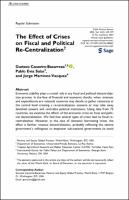Mostrar el registro sencillo del ítem
The Effect of Crises on Fiscal and Political Re-Centralization
| dc.contributor.author | Canavire-Bacarreza, Gustavo | |
| dc.contributor.author | Evia, Pablo | |
| dc.contributor.author | Martínez, J. | |
| dc.date.accessioned | 2025-05-09T17:40:53Z | |
| dc.date.available | 2025-05-09T17:40:53Z | |
| dc.date.issued | 2024-03-27 | |
| dc.identifier.uri | https://repositorio.catie.ac.cr/handle/11554/12776 | |
| dc.description.abstract | Economic stability plays a crucial role in any fiscal and political decentralization process. In the face of financial and economic shocks, when revenues and expenditures are reduced, countries may decide to gather resources at the central level creating a re-centralization scenario or may take away devolved powers and centralize political institutions. Using data from 75 countries, we examine the effects of the economic crisis on fiscal and political decentralization. We find that several types of crises lead to fiscal recentralization. However, in the case of domestic borrowing crises, the effect is further revenue decentralization, probably reflecting the central government’s willingness to empower sub-national governments to avoid similar crises. In addition, we explore the impact of the economic crisis on political decentralization and find that they are concordant with the fiscal decentralization effects, suggesting an alignment of the impact along political and fiscal dimensions of subnational autonomy. We also explore whether the economic crises trigger more permanent rather than just transitory changes in the level of decentralization, and we generally find more long-lasting effects in the case of fiscal decentralization measured from the expenditure side. This pattern is apparent in the cases of inflation and banking crises and is less precise but still present in the cases of currency and external debt crises. The main results are robust to different specifications, estimation methods, and the measurement of decentralization. | es_ES |
| dc.format.extent | 31 páginas | es_ES |
| dc.language.iso | en | es_ES |
| dc.publisher | SAGE Publications | es_ES |
| dc.relation.ispartof | Public Finance Review | es_ES |
| dc.relation.uri | https://doi.org/10.1177/10911421241240547 | es_ES |
| dc.subject | Política fiscal||fiscal policies||política fiscal||politique fiscale | es_ES |
| dc.subject | Estabilización económica||economic stabilization||estabilização económica||stabilisation économique | es_ES |
| dc.subject | Análisis económico||economic analysis||análise económica||analyse économique | es_ES |
| dc.subject | Inflación||inflation||inflação||inflation | es_ES |
| dc.subject | Crisis económica||economic crises||crise económica||crise économique | es_ES |
| dc.subject | FMI||IMF||FMI||FMI | es_ES |
| dc.subject.other | Sede Central | es_ES |
| dc.title | The Effect of Crises on Fiscal and Political Re-Centralization | es_ES |
| dc.type | Artículo | es_ES |
| dc.creator.id | https://orcid.org/0000-0002-2391-6957 | es_ES |
| dc.identifier.status | restrictedAccess | es_ES |
| dc.subject.sdg | ODS 8 - Trabajo decente y crecimiento económico | es_ES |


